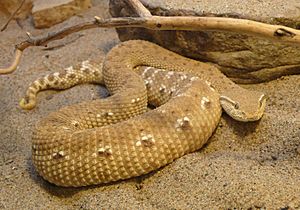Eristicophis facts for kids
Quick facts for kids Eristicophis |
|
|---|---|
 |
|
| Scientific classification | |
| Kingdom: | |
| Phylum: | |
| Subphylum: | |
| Class: | |
| Order: | |
| Suborder: | |
| Family: | |
| Subfamily: | |
| Genus: |
Eristicophis
|
| Species: |
E. macmahonii
|
The McMahon's Viper (scientific name: Eristicophis macmahonii) is a special type of viper snake. It's the only species in its group, which is called a monotypic genus. This snake is venomous, meaning it can inject poison. You can find it living in the desert areas where the countries of Iran, Pakistan, and Afghanistan meet.
People also call the McMahon's Viper by other names, like the "Asian Sand Viper," the "Leaf-nosed Viper," or the "Whiskered Viper."
Contents
What Does the McMahon's Viper Look Like?
The McMahon's Viper is a small snake. It usually grows to be less than one meter (about 3 feet) long. Female snakes are generally bigger than males. Males are typically 22 to 40 centimeters (about 9 to 16 inches) long, while females can grow from 28 to 72 centimeters (about 11 to 28 inches) long.
These snakes have colors that help them blend in with their sandy homes. They can be reddish-brown or yellowish-brown.
Where Do McMahon's Vipers Live?
You can find the McMahon's Viper in the desert parts of a region called Balochistan. This area is close to the borders of Iran, Pakistan, and Afghanistan. They prefer sandy environments.
How Do McMahon's Vipers Behave?
The McMahon's Viper is mostly active at night, which means it is a nocturnal animal. However, some people say it might also be active during early morning or late evening. This is called being crepuscular.
This snake is very good at moving on loose sand. It uses a special way of moving called "sidewinding." Sometimes, it even climbs into bushes. If you disturb a McMahon's Viper, it can become quite aggressive. It will hiss very loudly and might even raise its head off the ground to strike.
A cool trick this snake does is sinking into the sand. It moves its body in a rocking motion to bury itself. When it's hidden, only its eyes and snout stick out, allowing it to watch for prey or hide from danger.
What Do McMahon's Vipers Eat?
The McMahon's Viper is a predator. It hunts and eats smaller animals. Its diet includes small lizards, tiny rodents like mice, and sometimes even birds.
Reproduction and Life Cycle
The McMahon's Viper reproduces by laying eggs, which means it is an oviparous snake. A female viper usually lays about a dozen eggs at one time. These eggs need about 6 to 8 weeks to hatch. When the baby snakes hatch, they are quite small, usually around 15 centimeters (about 6 inches) long.
What About McMahon's Viper Venom?
Scientists are still learning a lot about the venom of the McMahon's Viper. Some studies suggest that its venom might be similar to the venom of another type of viper called the Echis.
Images for kids
 | James Van Der Zee |
 | Alma Thomas |
 | Ellis Wilson |
 | Margaret Taylor-Burroughs |


